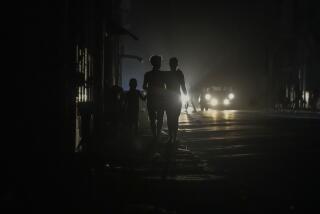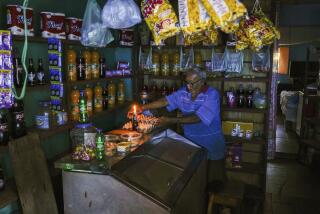Gas, food and street protests
TEGUCIGALPA, HONDURAS, AND MEXICO CITY â For a few hours Wednesday, Hondurasâ political drama gave way to more important matters -- like buying groceries and filling gas tanks.
Streets in the capital, Tegucigalpa, were clogged with frantic shoppers after the countryâs interim rulers briefly lifted a nationwide curfew to let residents restock shelves. Meanwhile, the deposed president, Manuel Zelaya, remained hunkered in a foreign embassy.
It was the first chance for residents to get out since Monday, when Zelaya sneaked back into Honduras and the de facto government abruptly imposed the shutdown. The curfew was to resume later Wednesday.
âI havenât had food at home for three days because the curfew caught us by surprise. I have to get milk for my three children,â said Mariega Garcia, a 40-year-old administrator.
Maria Cristina Juanes, a 41-year-old maid, waited in a long line in her impoverished neighborhood to buy milk and cheese. âWe donât know whatâs going to happen,â she said. âWe only have God on our side.â
The government lifted the curfew after a night of scattered clashes in Tegucigalpa. The confrontations left one man dead, authorities said, and a number of stores were looted or vandalized. Police arrested more than 100 people.
The sudden return of Zelaya, who was deposed June 28, and his decision to take shelter in the Brazilian Embassy have thrust the standoff back into view, but a quick resolution appeared unlikely. Many fear that his return could spark violence.
Police fired tear gas Wednesday afternoon after a pro-Zelaya demonstrator ignited a firecracker during a march toward the Brazilian compound. No injuries were reported.
Since Zelayaâs return, both sides have professed willingness to talk, but not to yield on their central demands. Zelaya, who said he came back to pursue a peaceful solution, demands to be reinstated as president. His term ends in January.
The government led by interim President Roberto Micheletti refuses, saying Zelaya must stand trial for charges that include treason and abuse of authority.
Still, Micheletti said he was willing to talk to Zelaya or any âserious and responsibleâ go-between. U.S. officials said the interim government agreed to allow a visit by Organization of American States officials who hope to mediate the crisis, perhaps as part of a wider international effort that would include the United Nations. The interim leaders view the OAS as biased, however, because it condemned Zelayaâs ouster.
Though Zelayaâs return could revive conciliation efforts, there is no guarantee they would yield results before Nov. 29, when voters are to choose a new president.
âHeâs given this new urgency,â said Peter Hakim, president of the Inter-American Dialogue, a Washington-based think tank. âIt could, by throwing over the apple cart, create new opportunities. Frankly, Iâm not very optimistic.â
Dozens of Honduran soldiers and police officers ringed the Brazilian Embassy, where Zelaya, his wife and supporters have taken refuge. About 3,000 union members who marched toward the embassy changed direction after police fired tear gas. âWe are in a crucial part of our struggle and we are not afraid,â union leader Gabriel Jackson Silva had said earlier.
Brazilian and U.S. officials have urged Hondurasâ interim leaders to leave the embassy, which is protected by international law, untouched. Micheletti said his government would respect those rules, but Zelaya must not be allowed to sow disorder from the safety of the foreign mission.
Costa Rican President Oscar Arias, a Nobel peace prize laureate, has proposed reinstating Zelaya until his term ends, but with limited powers. Micheletti rejects that, saying Zelayaâs ouster was done legally after the Supreme Court issued an arrest warrant.
The army hustled Zelaya to Costa Rica after he refused to discard plans for a referendum that foes saw as a ploy to keep him in power longer. Honduran courts ruled the vote illegal.
The U.S., which cut off some aid to Honduras, and other nations have said they wonât recognize the outcome of the November election unless Zelaya is reinstated first. The U.N. announced Wednesday that it was suspending help for Hondurasâ election agency. A statement said Secretary-General Ban Ki-moon âdoes not believe conditions are currently in place for the holding of credible elections that would advance peace and stability.â
But analysts said a policy of isolating Honduras could soften if the vote is seen as open and fair.
âNobody has intentions of keeping Honduras as a pariah state ad infinitum,â Hakim said.
--
Renderos is a special correspondent.
More to Read
Sign up for Essential California
The most important California stories and recommendations in your inbox every morning.
You may occasionally receive promotional content from the Los Angeles Times.










